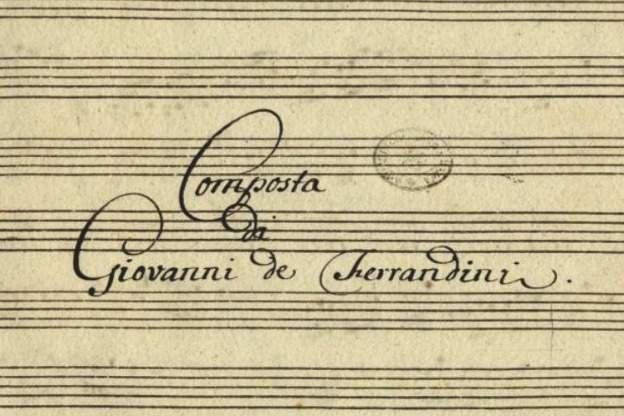
Giovanni Battista Ferrandini: Sacred Cantatas
Two new recordings present music by a composer whose music you may have heard, but whose name you might not know. That composer? Giovanni Battista Ferrandini, and the music that might seem familiar is the cantata Il pianto di Maria Vergine, a sacred work previously attributed to Handel.  The Lamentation of the Virgin Mary as she watches her son die contain incredibly sad texts, tinged with accusatory bitterness. The words of Mary in one aria translate "If I were made Mother of a God to see a God die, forgive me, Eternal Father, your grace is great torment." Another text depicts Mary, immobilized by grief, alive only enough to feel the dreadful enormity of suffering. In one of the dramatic recitatives, Mary, bewildered, shakes her fist at God-have you abandoned your son? She reproaches the angels-can't you hear him crying? And in bewilderment, calls out to the Holy Spirit… you at least could comfort him!
The piece was for a long time attributed to Handel, and can still be found under the catalogue number, HWV 234. And an anonymous manuscript dating from the early 18th century does have Handel's name on it, but an older copy, bound together with another sacred cantata, has since been discovered bearing Ferrandini's name in a personal collection in Bologna. That discovery seems to put the work solidly in Ferradini's court, and its under this composers name that the piece appears on this 2014 fra bernardo release.
Even more of Ferrandini's compositions can be found in the Maria Antonia archive in Dresden. It's where a different Passion cantata O spettaculo pur troppo funesto is held, this time, dramatizing the dialogue of Jesus and the thief on the cross next to him, who, has found in the end, redemption after all. What's so interesting about this cantata is its instrumentation for soprano accompanied by organ, lute and viols.Â
It's perhaps an unexpected sound for a gallant-leaning Italian composer writing in the early to mid-18th century (though lutes and viols are certainly not completely outside the realm of possibility…) Getting a grasp on Ferrandini's distinctive musical language and style is easier when you know that the Italian Ferrandini spent much of his life working abroad in Germany, where there was in fact, a continuing tradition of viol playing. Ferrandini moved to Munich when he was barely a teenager-there he played oboe in the service of Duke Ferdinand. By the age of 18, he had written his first opera and in his 20's, Ferrandini became a court composer, and later director of chamber music for Elector Karl Albrecht. Ferrandini also taught singing and composition to the Elector's daughter, Princess Maria Antonia. When she married and moved to Dresden in 1747, the Princess likely took Ferrandini's compositions with her.
This recording was put out by fra bernardo in 2014, and features Roberta Invernizzi, L'Opera Stravagante, and the Gambe de Legno Consort.
Secular Cantatas and Orchestral Music
More of Ferrandini's music is collected on a 2014 Accent release featuring Olivia Vermeulen and the orchestra, Harmonie Universelle that presents three secular cantatas from a manuscript volume of Ferrandini's 'Cantate con Istromenti' that has been preserved in the Dresden State Library.
A typical long Ferrandini slow movement, lasting over 10 minutes, recalls some of the Il pianto di Maria Vergine arias from the previous recording. The lament here though, is that of a poor sunflower, whose grief stems from her lack of scent-a "wretched plant"-though constant, unlike the jasmine, or the lily, or the rose.
The texts of these secular cantatas from Dresden are interesting. Remember Ferrandini's student Maria Antonia? We know for sure that the text of at least one of the cantatas in the set, was actually written by the princess…We learn from the extensive booklet notes included with this CD, that the text of cantata 4 beginning "Dell'idol mio traffitto..." exists in a Dresden collection of Maria Antonia's poems with the reference "cantata a voce sola: La musica e del Signor Ferandini"
Besides the cantatas, this CD by Harmonie Universelle, Â also provides a taste of Ferrandini's orchestral music, including the Sinfonia in B flat major.









